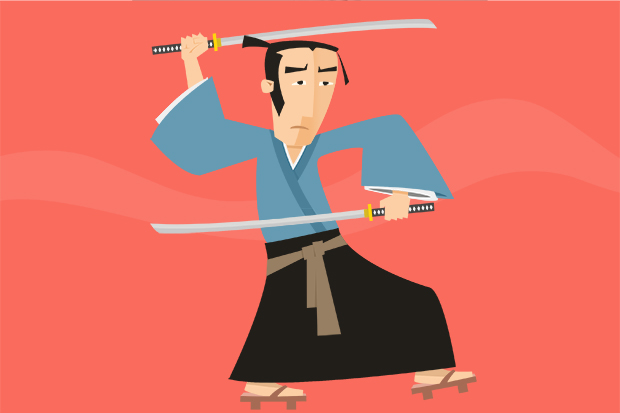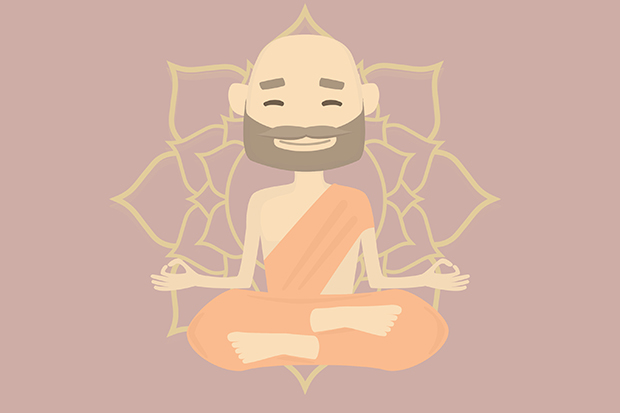on

The teachings of Buddhism are centred around enlightenment or self-realisation, an experience that is ineffable and inexplicable, beyond speculative thought and inquiry. While someone unfamiliar with the teachings might be tempted to dismiss the phenomenon as escapist fantasy, one should understand that enlightenment is real and is not a turning-away from life. It is the return to life having understood its nature. There is, however, a genuine danger of a practitioner getting caught in mere philosophising or ritualism. Though most of the techniques used to bring about enlightenment involve the mind, the mind is merely a means to an end. What is perceived by means of the intellect must be arrived at in actuality. What is attained by mentation is a poor facsimile. Talk of food never fills any bellies. But why is it difficult to transcend the mind?
Linji Yixuan, the founder of the Linji school of Ch’an Buddhism, once said:
If you meet the Buddha, kill the Buddha; if you meet the patriarchs, kill the patriarchs; if you meet an Arhat, kill the Arhat; if you meet your parents, kill your parents … in this way, you attain liberation.
The Ch’an tradition holds that Linji was attempting to shock students into the realisation that they themselves were the Buddha they sought. The phrase ‘kill the Buddha’ can perhaps be understood as a call to eschew religious doctrine and authority figures. But is that what the master meant? In Zen Mind, Beginner’s Mind, Shunryu Suzuki Roshi says:
Zen master will say, ‘Kill the Buddha!’ Kill the Buddha if the Buddha exists somewhere else. Kill the Buddha, because you should resume your own Buddha nature.
It means that if one sees Buddha and oneself, one is on the wrong track and must abandon it. But is that all?
It is true that the Buddha and the patriarchs are just reflections of oneself. And that one must essentially see through oneself to attain. We arrive at the realisation that there is no self and, hence, no other once we grasp that which functions as the self and as the other. You leave the two to arrive at one. But the same understanding cannot help us depart from there. Even the one must be abandoned. People who prize understanding stay stuck there. Like a donkey tethered to a stake driven into the ground, they keep circling it. We must learn to let go. We must trust that, having let go, we will come across it again. Kill the Buddha. If not, you will remain tied to the understanding you so value, caught in those useless rituals and thoughts that you believe sustain your understanding. The unborn is to be realised in the empty nature of phenomena.
Why do people who glimpse their nature remain caught in causes? Is it because they value attainment? The mind is still functioning in them, so they keep on giving and receiving. They see attainment as a function of the mind. They have no other option but to keep setting up these conditions again and again. Having arrived where they are using their minds, they cannot give it up. Depending on thought constructs, you cannot get very far. Your need for conceptual constructions keeps you tied to existence. People exhaust themselves trying to function from the mind. Attainment is not in the conditions that bring it about. Understand that even the Buddha has not attained. The source is to be realised outside the teachings and methods. There is a path. But once the journey has been made, the path must be forgotten. One who sees the path as the end cannot make it any further. Where the tracks end, he sees no way forward. Enlightenment is essentially no-enlightenment.
Linji’s words, with their iconoclastic echoes, remind me of an incident from the life of Huineng, the Sixth Patriarch of Ch’an. At that time, Huineng was an assistant in the kitchen at the monastery of Master Hongren, the Fifth Patriarch. Hongren proposed a poetry contest for his followers to demonstrate their understanding of the nature of mind and to settle the matter of his succession. He announced that he would be passing down his robe and bowl to the winner of the contest as a symbol of formal approval. It was understood that Shenxiu, the head monk, would win, and the rest of the monks did not even bother to try. Shenxiu, however, was uncertain of his understanding. Lacking the courage to present it before the master, he chose to write his poem on a corridor wall in the night. The other monks thought the verse praiseworthy, but Hongren was not satisfied. Shenxiu’s stanza was as follows:
The body is the Bodhi tree,
The mind a bright mirror’s stand.
Never refrain from polishing it,
Never let dust alight.
Hongren spoke to Shenxiu privately, telling him to try again since he seemed not to have entered “the gates of understanding.” Hongren, however, advised the other monks to commit the stanza to memory.
Huineng overheard one of the students chanting Shenxiu’s poem and immediately understood that the poem fell short. Huineng asked to be led to the corridor, where he requested another student write down a stanza that he composed. His stanza seemed to refute Shenxiu’s, and it read:
Bodhi has no tree,
Mirror bright has no stand.
Fundamentally there is not a single thing,
Where can dust alight?
The other monks were astonished. Hongren, fearing that they might harm Huineng, was quick to dismiss the poem as lacking in understanding. The following night, Huineng was called to Hongren’s chamber and was handed the bowl and robe. Hongren then instructed him further and directed him to flee to the mountains under cover of night.
Now, where did Shenxiu’s fault lie? Shenxiu was at the gates, all right. But to go beyond, he needed to see that his understanding could be laid aside. Understanding is half the journey. But learning to let go of that understanding is the rest. Shenxiu understood the mind and the need to keep it pure. But he did not see that this need to keep the mind untainted was rooted in causes. In the absence of causes, the mind does not stir. What need is there to keep it pure? Huineng’s poem by itself isn’t complete. But together, the stanzas give a complete picture. Is there an end to the process of keeping the mind mirror clean? Not while one has not seen into the causes. Huineng sees the impasse and shows the way forward. Huineng understands that what one is, is a function of where one is. He knows what needs to be done and gives no quarter. He snatches away the means with which people cling. Huineng, you must not forget, had his first inkling of truth on hearing the Vajracchedikā sūtra read out by a patron of his in his life before monkhood in which he made a living selling kindling. His stanza manages to capture the sutra in its essence.
What Shenxiu achieved, however, is no small feat. To realise that the inside is just the outside reflected is no mean accomplishment. But he does not see the implications of that. The inside is constructed out of gain and loss, from grasping and rejecting. Where are gain and loss if there is no outside world? What does one grasp or reject if there is nothing outside? One has to understand that the mind must be kept clean and yet see that there is no mind. Shenxiu sees the outside. He sees the inside. He sees the outside reflected inside. He perhaps even understands that if not for the outside, there is no inside. He does not, however, see that his mind is not. What he looks at is a reflection of a reflection of a reflection. Where does one apprehend reality in there? Why struggle with the mind? How long can you keep it up?
Let me explain by means of a simpler example. Think of it as a progression of mental states. These states feel real till one takes a closer look. Consider one is angry. Say one starts with “I am angry.” Then one moves on to “There is anger and as a consequence, me.” Then one gets to “There is anger, not me.” The anger seen into one gets to “There is no anger.” But these are all conceptual constructs. At this point, one is still within the mind. The constructs are the mind. Do you remain as the mind? Or do you see the way out? There is a chasm to be crossed. And it will cost you your life. This is the same with the Buddha and patriarchs. You exist in juxtaposition to the other till there is no other. But what do you escape into? When the mind is seen through, you see the true nature, you perceive emptiness. But can you function from there?
Shenxiu sees form and reflection and sees that he is not. Yet he remains. Though one’s true nature is revealed in activity, it is not apprehended in activity. Though one may measure one’s distance from the truth by looking at what is revealed, it does not aid in bridging that distance. Huineng shatters the mirror and puts an end to all the contriving and strategising, but he is not recommending inactivity. If it is to be apprehended neither in activity nor in inactivity, where is it? Why gather provisions for a journey that need not be made? That one speaks and the other understands is what helps us carry on with the business of life. That one speaks and the other understands if understood life itself is understood.




